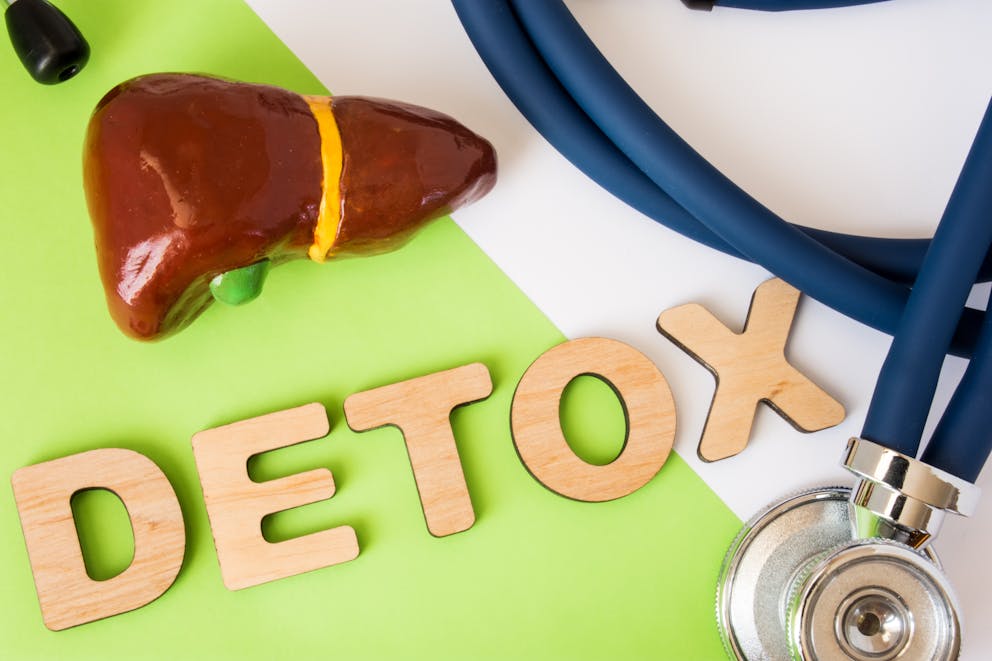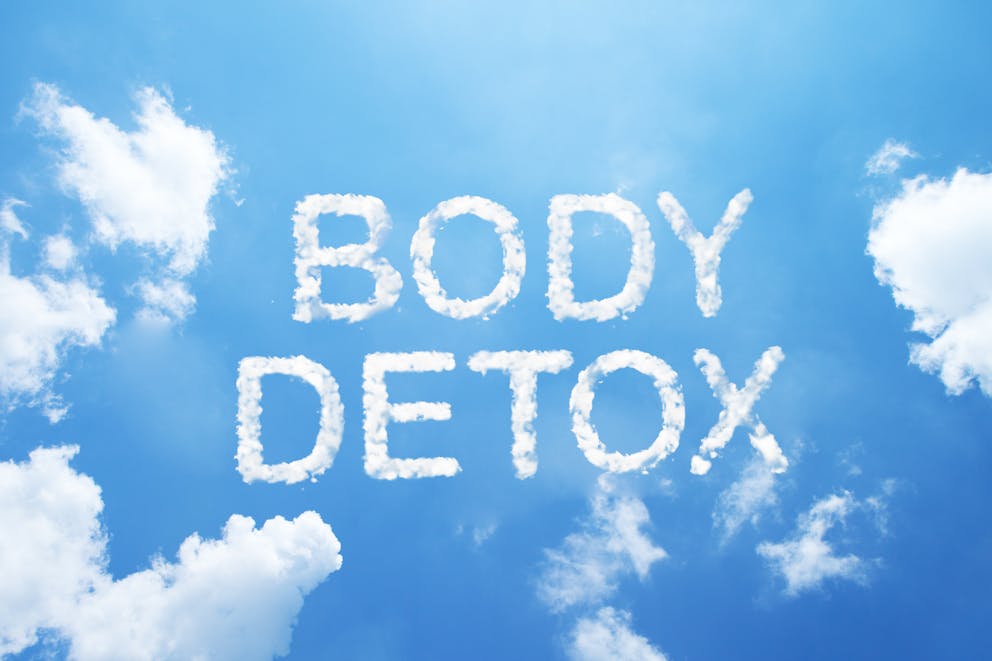How to Use Fasting to Detox
Fasting helps reduce liver fat and promotes a healthy liver, which is the body’s natural detox center responsible for the elimination of toxins, environmental pollutants, and waste products.
Learn how to use fasting to detox and discover why calorie restriction is one of the best strategies to improve your health and well-being.

What is detoxification?
Detoxification refers to a set of biochemical processes that metabolize and eliminate a wide range of potentially harmful substances, including metabolic waste products, heavy metals, hormones, environmental toxins, and alcohol.
While body detoxification involves several organs, including the kidneys, lungs, skin, and the digestive system, the liver is the main site of detox reactions.
A healthy liver is highly effective in filtering, processing, and eliminating toxins and waste products.
However, poor liver health can result in sluggish detoxification and a build-up of potentially harmful substances in the body, which can negatively impact cellular health, hormonal balance, metabolic functions, and immune defenses.
According to the National Liver Foundation (NLF), it’s estimated that more than 100 million adults in the U.S. have some form of liver disease, leaving a large proportion of the population at risk of impaired detoxification.
Poor detoxification can have serious health consequences and is linked to various medical conditions, including heart disease, high blood pressure, respiratory problems, skin issues, and liver dysfunction.
Watch the video below to discover the impressive health benefits of fasting.
5 ways fasting helps detoxify and heal
Most medical experts agree that fasting itself doesn’t detoxify the body. However, caloric restriction triggers profound metabolic, hormonal, and cellular changes that promote the body’s ability to cleanse and rejuvenate itself.
Here are five benefits of fasting for detoxification.
1. Reduces liver fat
The accumulation of liver fat is a primary cause of fatty liver disease and is typically linked to a diet high in sugar, carbs, and processed foods.
The liver converts excess sugars and carbs into fatty acids and deposits them into liver cells, which disrupts normal liver function and explains why fatty liver disease can slow down detoxification processes.
Research published in Diabetes, Metabolic Syndrome, and Obesity found that fasting is a highly effective therapeutic strategy to reduce and even reverse fatty liver disease.
“Fasting pushes your metabolism to utilize fats instead of sugar as a primary fuel source,” explains Dr. Berg. “This forces the liver to burn stored fatty acids, which reduces liver fat and improves overall liver health.”
Fasting helps cleanse your liver from fat accumulations, promoting liver cell function and enhancing the body’s detoxification capacities.
2. Promotes autophagy
Fasting triggers autophagy, a cellular recycling and repair mechanism that removes waste products and damaged cell components and helps cleanse tissues from toxins and heavy metals.
Autophagy plays a crucial role in removing toxins and other potentially harmful substances from cells, which allows their elimination from the body.
Evidence published in Advances in Nutrition confirms the autophagy-promoting effects of fasting and concludes, “Intermittent fasting and calorie restriction can lead to the induction of adaptive autophagy and increase cellular longevity.”

3. Supports weight loss
Many overweight or obese individuals suffer from chronically elevated blood sugar levels and insulin resistance, which stimulates fat storage and creates a vicious cycle of weight gain and metabolic imbalances.
Time-restricted eating pushes the body to utilize stored body fat as an energy source, promotes metabolic health, and is linked to reduced blood sugar levels, making it a highly effective method to lose weight.
Certain heavy metals and organic pollutants are stored in fat cells, and losing weight helps release toxins and reduces the body’s overall toxic load, which is linked to a lower risk of inflammatory health conditions, hormone imbalances, and fertility issues.
4. Stimulates detox enzyme production and activity
Detox reactions rely on a complex interplay between several detoxification enzymes that convert toxins into water-soluble and less harmful substances that are easier to process and excrete.
A study published in Molecular and Cellular Proteomics found that fasting can upregulate the production of detox enzymes and enhanced enzymatic activity in the liver, which is associated with a higher rate of toxin clearance.
5. Promotes a diverse microflora
Consuming fewer calories can promote the growth of beneficial gut bacteria, which supports a diverse intestinal microflora.
Specific strains of gut bacteria can alter the structure of various environmental toxins, which helps prevent their intestinal absorption and eases the liver’s detoxification burden.
In addition, some intestinal microbes have been found to produce enzymes capable of detoxifying mycotoxins, a toxic substance produced by certain mold species that has been linked to serious health issues and even death.

How to use fasting to detox
Fasting involves voluntary abstinence from solid food for prolonged periods, which triggers metabolic and hormonal changes associated with improved liver cell function, enhanced detoxification processes, and better health and well-being.
There are several fasting schedules that can be used to promote detoxification:
Intermittent fasting refers to eating only during a specific daily eating window. The 16:8 method is a popular fasting schedule that involves 16 hours of fasting followed by an eight-hour eating period.
One meal a day (OMAD) is a form of intermittent fasting characterized by eating one large meal during a 24-hour period and fasting for the remaining 23 hours.
Prolonged fasting refers to abstaining from food for one to five days, followed by returning to your regular meal schedule. Popular examples of prolonged fasting routines are 24-hour or 48-hour fasts.
Whether you are considering intermittent or prolonged fasting to promote detoxification, it’s crucial to slowly ease into your chosen fasting schedule.
Your body needs time to adapt to caloric restriction, and trying to fast for extended periods too quickly is one of the biggest fasting mistakes.
While fasting is an excellent strategy to support the elimination of toxins, consuming a healthy diet is equally important.
Combining intermittent fasting with a nutritious low-carb diet like Healthy Keto® can maximize the benefits of caloric restriction for liver health and promote a healthy body weight, which is crucial to minimizing toxin accumulation in fat cells.
Fasting can accelerate water loss, and staying hydrated is vital to maintaining liver cell function and enabling effective toxin clearance via the kidneys and urine.
Consuming plenty of fluids also helps extend your fasting window, and drinking lemon water while fasting supports liver function and promotes optimal hydration, which are crucial aspects of effective detoxification processes.
In addition, fresh lemon juice is a rich source of vitamin C, which has been found to stimulate the production of glutathione, a critical antioxidant that protects liver cells from the harmful effects of detox reactions.

Possible risks of using fasting to detox
Fasting is generally considered safe and practiced by millions of people worldwide for spiritual, religious, or health-related reasons.
However, it’s important to understand the potential risks of fasting to detox.
Fasting, especially in combination with a ketogenic diet, can cause rapid weight loss. While this generally is considered a benefit, individuals with a high toxic load can experience an accelerated release of toxins stored in fat cells, which can overwhelm the body’s detoxification capacity.
Transitioning slowly into a fasting schedule and supporting the body’s detoxification capabilities with liver-cleansing herbs can help buffer toxin release from fat cells and promote effective toxin clearance.
Fasting can cause body mineral fluctuations, which increases the risk of electrolyte imbalances and dehydration.
Replenishing electrolytes while fasting is crucial to maintaining the body’s fluid balance, which supports detoxification processes and promotes overall health and well-being.
In addition, people with a history of eating disorders, pregnant and breastfeeding mothers, and those with kidney dysfunction and liver failure should avoid fasting or discuss calorie restriction with a healthcare provider to minimize the risk of side effects.

Key takeaways
There are many reasons to use fasting to detox.
Fasting helps reduce liver fat, promotes weight loss, and triggers autophagy, all of which support the body’s ability to metabolize and eliminate toxic compounds.
Whether you are considering intermittent or prolonged fasting to detox, it’s crucial to slowly transition into your fasting routine, consume plenty of fluids, and replenish electrolytes during your fasts to avoid dehydration.
FAQ
1. Can you use fasting to detox?
Yes, fasting is an excellent strategy to support the body’s detoxification processes.
Fasting helps improve liver function, promotes a healthy body weight, triggers autophagy, and stimulates the production of detoxification enzymes, all of which enhance the liver’s ability to process and eliminate various toxic compounds.
2. How long should you fast to detox your body?
While regular 24-hour or 48-hour fasts can support the liver’s detoxification processes, a consistent intermittent fasting schedule with a 16 to 18-hour fasting window is ideal for promoting liver health and supporting the body’s natural detoxification processes.
3. How do I start fasting for detoxification?
It’s important to transition slowly into your chosen fasting schedule, combine intermittent fasting with Healthy Keto®, drink plenty of water during your fasting window, and replenish electrolytes to maintain optimal fluid balance.
4. Does intermittent fasting detox your body?
While intermittent fasting itself doesn't detoxify the body, caloric restriction triggers profound metabolic and hormonal changes that promote healthy liver function and amplify the body’s natural ability to eliminate toxins, metabolic waste products, heavy metals, and other potentially harmful substances.
5. Does prolonged fasting help with detoxification?
Yes, regularly fasting for 24 or 48 hours can help with detoxification.
Prolonged fasting can reduce liver fat, which promotes liver cell function and detoxification. In addition, prolonged caloric restriction allows for extended periods of autophagy, a cellular repair mechanism that helps remove damaged proteins, toxins, and heavy metals from cells.
6. How long does it take for fasting to detox your body?
How long it takes for fasting to detox your body depends on your fasting schedule, diet and lifestyle habits, and health status.
While some individuals notice enhanced well-being after a couple of weeks of intermittent fasting, others may require several weeks of practicing calorie restriction to improve the liver’s ability to remove toxins.
Sources

Popular
08/21/2024
55.7K views
02/23/2025
46.8K views
11/18/2024
281K views
03/18/2024
11/21/2022




